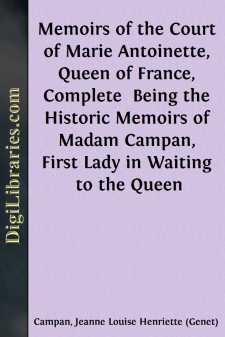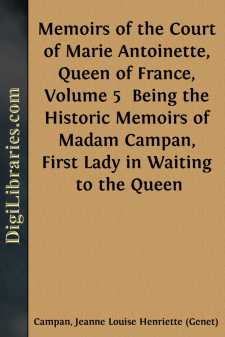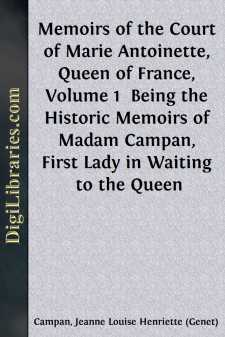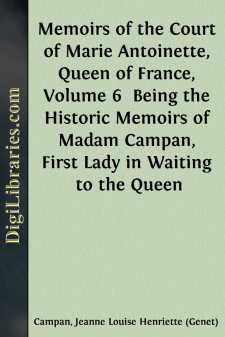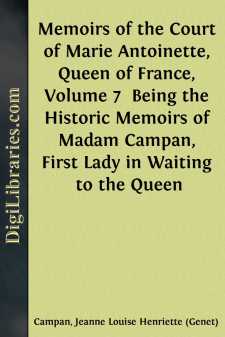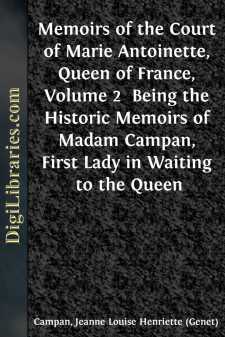Categories
- Antiques & Collectibles 13
- Architecture 36
- Art 48
- Bibles 22
- Biography & Autobiography 813
- Body, Mind & Spirit 142
- Business & Economics 28
- Children's Books 15
- Children's Fiction 12
- Computers 4
- Cooking 94
- Crafts & Hobbies 4
- Drama 346
- Education 46
- Family & Relationships 57
- Fiction 11828
- Games 19
- Gardening 17
- Health & Fitness 34
- History 1377
- House & Home 1
- Humor 147
- Juvenile Fiction 1873
- Juvenile Nonfiction 202
- Language Arts & Disciplines 88
- Law 16
- Literary Collections 686
- Literary Criticism 179
- Mathematics 13
- Medical 41
- Music 40
- Nature 179
- Non-Classifiable 1768
- Performing Arts 7
- Periodicals 1453
- Philosophy 64
- Photography 2
- Poetry 896
- Political Science 203
- Psychology 42
- Reference 154
- Religion 513
- Science 126
- Self-Help 84
- Social Science 81
- Sports & Recreation 34
- Study Aids 3
- Technology & Engineering 59
- Transportation 23
- Travel 463
- True Crime 29
Memoirs of the Court of Marie Antoinette, Queen of France, Volume 3 Being the Historic Memoirs of Madam Campan, First Lady in Waiting to the Queen
Description:
Excerpt
During the first few months of his reign Louis XVI. dwelt at La Muette, Marly, and Compiegne. When settled at Versailles he occupied himself with a general examination of his grandfather's papers. He had promised the Queen to communicate to her all that he might discover relative to the history of the man with the iron mask, who, he thought, had become so inexhaustible a source of conjecture only in consequence of the interest which the pen of a celebrated writer had excited respecting the detention of a prisoner of State, who was merely a man of whimsical tastes and habits.
I was with the Queen when the King, having finished his researches, informed her that he had not found anything among the secret papers elucidating the existence of this prisoner; that he had conversed on the matter with M. de Maurepas, whose age made him contemporary with the epoch during which the story must have been known to the ministers; and that M. de Maurepas had assured him he was merely a prisoner of a very dangerous character, in consequence of his disposition for intrigue. He was a subject of the Duke of Mantua, and was enticed to the frontier, arrested there, and kept prisoner, first at Pignerol, and afterwards in the Bastille. This transfer took place in consequence of the appointment of the governor of the former place to the government of the latter. It was for fear the prisoner should profit by the inexperience of a new governor that he was sent with the Governor of Pignerol to the Bastille.
Such was, in fact, the truth about the man on whom people have been pleased to fix an iron mask. And thus was it related in writing, and published by M. ——- twenty years ago. He had searched the archives of the Foreign Office, and laid the real story before the public; but the public, prepossessed in favour of a marvellous version, would not acknowledge the authenticity of his account. Every man relied upon the authority of Voltaire; and it was believed that a natural or a twin brother of Louis XIV. lived many years in prison with a mask over his face. The story of this mask, perhaps, had its origin in the old custom, among both men and women in Italy, of wearing a velvet mask when they exposed themselves to the sun. It is possible that the Italian captive may have sometimes shown himself upon the terrace of his prison with his face thus covered. As to the silver plate which this celebrated prisoner is said to have thrown from his window, it is known that such a circumstance did happen, but it happened at Valzin, in the time of Cardinal Richelieu. This anecdote has been mixed up with the inventions respecting the Piedmontese prisoner.
In this survey of the papers of Louis XV. by his grandson some very curious particulars relative to his private treasury were found. Shares in various financial companies afforded him a revenue, and had in course of time produced him a capital of some amount, which he applied to his secret expenses. The King collected his vouchers of title to these shares, and made a present of them to M. Thierry de Ville d'Avray, his chief valet de chambre.
The Queen was desirous to secure the comfort of Mesdames, the daughters of Louis XV., who were held in the highest respect. About this period she contributed to furnish them with a revenue sufficient to provide them an easy, pleasant existence: The King gave them the Chateau of Bellevue; and added to the produce of it, which was given up to them, the expenses of their table and equipage, and payment of all the charges of their household, the number of which was even increased....



